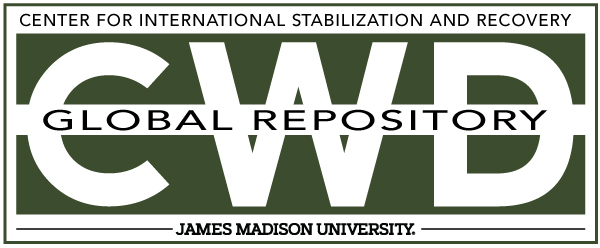Document Type
Other
Creative Commons License

This work is licensed under a Creative Commons Attribution-Noncommercial-No Derivative Works 4.0 License.
Publication Date
2019
Keywords
ERW Clearance, Iraq, UNMAS, 2019, Program Report
Abstract
Transition: In 2019, UNMAS Iraq, along with its implementing partners and in collaboration with other United Nations (UN) organizations, continued to contribute to that end despite continuing security threats where we work, political uncertainty, social unrest, and reduced fund-ing for our clearance work, risk education programmes, and technical assistance provided to our Iraqi counterparts. In response, UNMAS Iraq:
- Clearance: Introduced a new business model with a reduced “international footprint”. By gradually reducing international staff and re-deploying the remainder from “hands on” clearance tasks to exclusively supervisory, consultative and quality assurance roles in support of an increased, fully qualified local staff. UNMAS Iraq maintained standards and reduced costs while employing an increased number of highly trained national staff and others. (See Training, below)
-
» Risk Education: Enhanced continuing “face-to-face” risk education programs with a major new multi-media campaign, including mass-, social-, and interactive media to expand reach – more impressions at a reduced “per impression” cost. At the conclusion of the campaign in 2020, an independent research firm will conduct an opinion survey to evaluate responses for cost-effectiveness as a guide for fine-tuning continued risk education programmes.
-
» Training: Continued to conduct Explosive Hazard First Response (EHFR) and Safe and Secure Approaches in Field Environment (SSAFE) courses among others for DMA and IKMAA staff as well as local authorities and police. Nearly one-third of the 1,433 graduates of both courses were women. UNMAS Iraq views the training of women police officers, for example, as important evidence of follow through consistent with women’s empowerment goals by positioning them for advancement within their peer group. UNMAS Iraq trained another 49 police officers in three, rigorous 16- week long EOD/IEDD sessions. Altogether, more than 2,800 persons attended UNMAS Iraq training of all types.
-
echnical Assistance: Positioned advisors within Iraq’s Joint Coordination and Monitoring Center (JCMC) and co-chaired the Coordination Mechanism for Mine Action in Iraq (CMMAI), and Technical Working Group (TWG) meetings, with the aim of coordination of mine action activities among all mine action partners including NGOs, commercial companies, NATO, and others. Midway through 2019, UNMAS Iraq launched a new consultative initiative with DMA, a stronger emphasis on a collaborative, needs-based issue management and problem-solving, knowledge-transfer conducive to long term skill retention important for sustainability in the sector.
Included in
Defense and Security Studies Commons, Peace and Conflict Studies Commons, Public Policy Commons, Social Policy Commons



